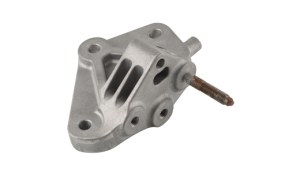Based on the theory of stir cast invented by Mr. D.B. Spencer and M.C.Flemings, the semi-solid die casting technic has been further developed and applied over 30 years world wide. The main principle of this technic is to perform a strong stir during the metal phase change from liquid to solid, thus break the cylindrical and dendritic crystal to achieve much smaller grain size. While this phase still maintains certain flow property, the die casting could be performed to the metal.
The Advantages Of Semi-solid Die Casting
The advantage of semi-solid die casting is contributed from the very nice microstructure product it resulted in. As the rough big crystal was removed, leaving small, even, dense structure metal, the final products possess a number of the fine properties, and the casting process is more controllable as well.
Semi-Solid Forming Principle
The unique rheological and churning properties of non-dendritic semi-solid metals (SSM) are used to control the quality of castings. The three stages of liquid, solid, and semi-solid metals exhibit distinct physical properties, and these properties have led to a variety of methods of solidification, plasticity, and semi-solid metal forming. Semi-solid metals (alloys) are internally characterized by the coexistence of mixed solid-liquid phases and the presence of metallic liquids at grain boundaries, which vary in the state depending on the solid phase fraction. It can be seen that at high solid phase fraction, the liquid phase component is limited to some of the grain boundaries; at low solid phase fraction, the solid phase particles are free in the liquid phase component.
Advantages of Semi solid Die Casting
Higher viscosity than liquid metal, easier to control: less gas entrained in the mold, less oxidation, improved processability, less mold bonding, higher speed part forming, improved surface finish, easy automation, and formation of new processing processes.
Lower flow stress than solid metal: semi-solid slurry has rheological and thixotropic properties, very small deformation resistance, can form parts at higher speeds and can perform complex part forming, shorten processing cycles, improve material utilization, contribute to energy and material savings, and allow high-speed forming of continuous shapes (such as extrusion) and low processing costs.
Wide range of applications: all alloys with the solid-liquid two-phase area can achieve semi-solid processing, can be applied to a variety of processing processes, such as casting, rolling, extrusion and forging, etc., and can be used for material compounding and forming.
Rayforce Manufacture is a private foundry manufacturer, we provide metal casting china, vacuum die casting and etc. Want to know more? Please contact us.
Ubicación : No.1-101, building no.18, gate no.189, Nanneihuan street, Yinze district, Taiyuan city, Shanxi province, China, 030001 Yinze,
Persona a contactar : castings ray, 0351 4086352








